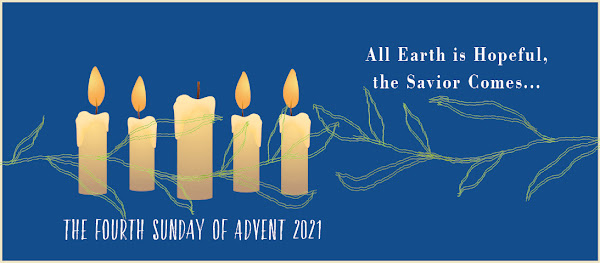Luke 1:46b-55
And Mary said,
I'm bursting with God-news;
I'm dancing the song of my Savior God.
God took one good look at me, and look what happened—
I'm the most fortunate woman on earth!
What God has done for me will never be forgotten,
the God whose very name is holy, set apart from all others.
God's mercy flows in wave after wave
With a bare arm God showed strength,
scattered the bluffing braggarts.
Knocked tyrants off their high horses,
pulled victims out of the mud.
The starving poor sat down to a banquet;
on those who are in awe before this God.
the callous rich were left out in the cold.
God embraced the chosen child, Israel;
God remembered and piled on the mercies, piled them high.
It's exactly what God promised,
beginning with Abraham and right up to now.
The Message (MSG), alt. Copyright © 1993, 2002, 2018 by Eugene H. Peterson
Magnificat icon by Scott Ward Art
Magnificat
Both the responsive psalm and the gospel for Advent 4 feature Mary/Miriam's Magnificat we sing every day at Evening Prayer/ Vespers; in addition, the appointed gospel reading begins with Mary's visit to her cousin Elizabeth—pregnant with John the Baptist. When churches use the Magnificat as the response in place of an OT psalm, they sometimes omit the Magnificat section of the gospel, though it's so glorious, why not read it or sing it twice?
Although we have words Luke wrote, it's very likely Mary sang a very similar song because this passage closely evokes Hannah's song in 1 Samuel 2:1-10. Mary would have been familiar with large chunks of scripture, so she'd have been able to recite and paraphrase them, making those texts her own.
Magnificat is Latin for making larger, magnifying, making greater, like a magnifying glass does. It has the same root as "magnificent." The office of Vespers/Evening Prayer in the liturgy of the canonical hours always includes a spoken or sung Magnificat.
Mary
Coming out of the theological traditions of the Reformation, I need to remember that Martin Luther had a great devotion to Mary, though I still haven't learned how to have an attitude of devotion and reverence toward a person or place without making it more central in my life than Jesus Christ. In my previous city of San Diego I served on the Ecumenical Council's Faith, Order and Witness committee, and moderated one of our discussions of the Anglican-Roman Catholic agreed statement Mary: Grace and Hope in Christ, though when I checked my blog archives I realized that was one I didn't blog. I think Mary is awesome… and as a model for us to follow Mary said, "Yes! I will, yes!"
• What are your thoughts and feelings about Mary, Mother of Jesus?
Musical Settings
Sometimes speech simply isn't enough. Consider how pale "And His Name shall be called, "Wonderful! Counselor! The Mighty God, Everlasting Father, Prince of Peace," comes across on the printed page or read aloud once you've heard "For Unto us a Child is Born" from Handel's Messiah!
I've quit blogging links to YouTube videos because they don't necessarily have a long shelf life, but I'm happy to list three musical settings of the Magnificat that fully capture its promise:
• J.S. Bach, Magnificat in D Major, BWV 243 for 5-part (2 sopranos, alto, tenor, and bass) chorus and orchestra that includes trumpets and timpani.
• Dale Wood, "My Soul Proclaims the Greatness of the Lord" from Evening Prayer in the Lutheran Book of Worship. I'll never be able to comprehend why this powerful setting didn't get into the denomination's most recent generic hymnal, Evangelical Lutheran Worship.
• Rory Cooney, "Canticle of the Turning," set to a traditional Irish tune – Star of the County Down – is in almost all recent English language hymnals. YOU NEED TO DANCE to this song!

No comments:
Post a Comment